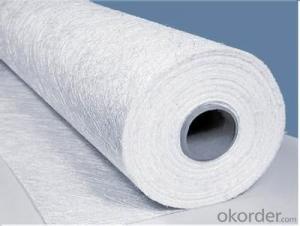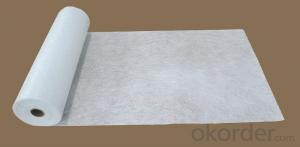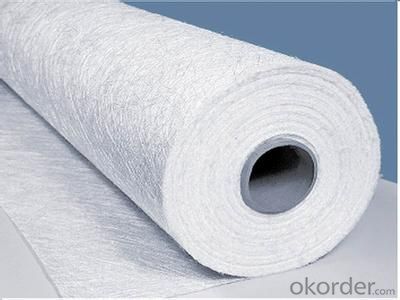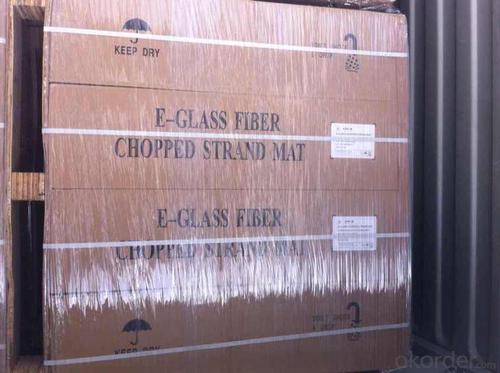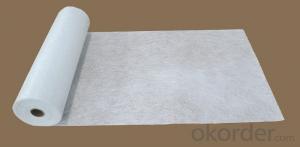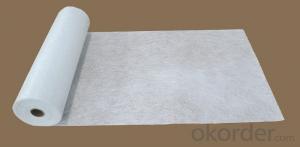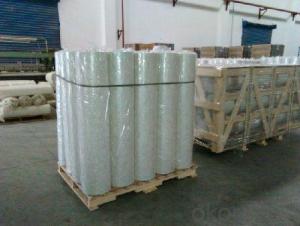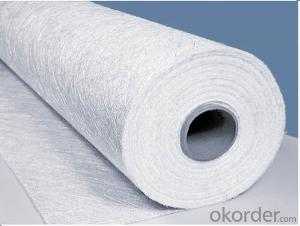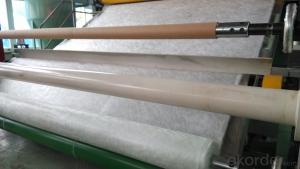Fiberglass Mat Tissue E-Glass Fiber Chopped Strand Mat with Powder Binder Bonded
- Loading Port:
- Shanghai
- Payment Terms:
- TT OR LC
- Min Order Qty:
- 20000 kg
- Supply Capability:
- 200000 kg/month
OKorder Service Pledge
OKorder Financial Service
You Might Also Like
1.Brief Introduction
It is designed for use in hand lay-up, filament winding, compression molding and continuous laminating processes. Its end-use applications include boats, bath equipment, automotive parts, chemical corrosion resistant pipes, tanks, cooling towers and building components
2.Product Features
High tensile strength, allowing for use in hand lay-up process to produce large-area parts
Good wet-through and fast wet-out in resins, rapid air lease
3.Product Specifications
Property | Area Weight | Moisture Content | Size Content | Breakage Strength | Width |
(%) | (%) | (%) | (N) | (mm) | |
Property | IS03374 | ISO3344 | ISO1887 | ISO3342 | |
EMC80P | ±7.5 | ≤0.20 | 8-12 | ≥40 | 50-3300 |
EMC100P | ≥40 | ||||
EMC120P | ≥50 | ||||
EMC150P | 4-8 | ≥50 | |||
EMC180P | ≥60 | ||||
EMC200P | ≥60 | ||||
EMC225P | ≥60 | ||||
EMC300P | 3-4 | ≥90 | |||
EMC450P | ≥120 | ||||
EMC600P | ≥150 | ||||
EMC900P | ≥200 |
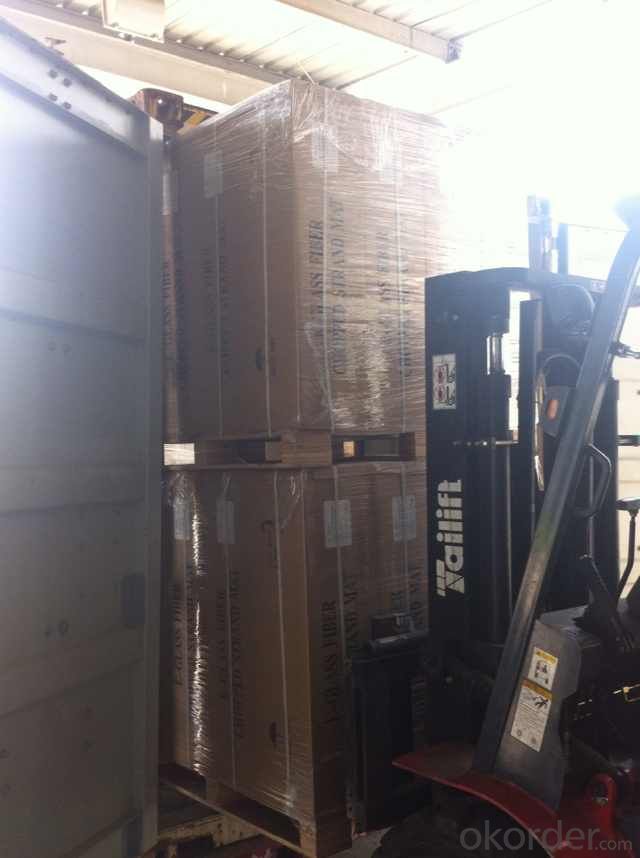
4.FAQ
Packaging:
Each Chopped Strand Mat is wound onto a paper tube which has an inside diameter of 76mm and the mat roll has a diameter of 275mm. The mat roll is wrapped up with plastic film,and then packed in a cardboard box or wrapped up with kraft paper.
- Q: Can fiberglass mat tissue be used for acoustic insulation?
- Indeed, acoustic insulation can be achieved by utilizing fiberglass mat tissue. This lightweight material possesses remarkable sound absorption qualities, allowing it to proficiently absorb and diminish sound waves, thereby reducing noise levels and enhancing the acoustic atmosphere. In the realm of construction, fiberglass mat tissue is widely employed to insulate walls, ceilings, and floors in order to minimize noise propagation. Moreover, it finds application in the automotive sector and various other industries that demand sound insulation. With its exceptional porosity and fibrous composition, fiberglass mat tissue proves to be an optimal substance for sound wave absorption and attenuation, rendering it highly suitable for acoustic insulation purposes.
- Q: How does the fiber distribution of fiberglass mat tissue affect its strength?
- The fiber distribution of fiberglass mat tissue plays a crucial role in determining its strength. A more uniform and evenly distributed fiber arrangement enhances the overall strength and structural integrity of the material. This is because the fibers can effectively distribute and share the applied load, preventing localized stress concentrations and potential weak points. In contrast, an uneven or random fiber distribution may lead to areas with fewer or misaligned fibers, reducing the material's overall strength and making it more prone to failure. Therefore, a well-controlled and uniform fiber distribution is essential for maximizing the strength and performance of fiberglass mat tissue.
- Q: How is fiberglass mat tissue used in the production of agricultural equipment?
- Fiberglass mat tissue, a thin fiberglass material, plays a vital role in agricultural equipment production. It is mainly used as a reinforcement material during the manufacturing process of agricultural machinery like tractors, harvesters, and sprayers. One significant use of fiberglass mat tissue in agricultural equipment production is constructing structural components. The tissue reinforces body panels and chassis, providing strength and durability to the machinery. This reinforcement enhances the overall structural integrity and load-bearing capacity of the equipment, making it more reliable and capable of withstanding harsh conditions. Furthermore, fiberglass mat tissue is employed in agricultural equipment production due to its corrosion resistance properties. Agricultural machinery is often exposed to chemicals, fertilizers, and the elements. By incorporating fiberglass mat tissue in the manufacturing process, the machinery becomes more resistant to corrosion. This increases its lifespan and reduces maintenance costs. In addition, fiberglass mat tissue is utilized to enhance insulation and soundproofing capabilities in agricultural equipment. By adding layers of the tissue between panels and components, the machinery becomes better insulated against temperature fluctuations, reducing energy loss and improving efficiency. Moreover, the tissue helps dampen noise and vibration, creating a quieter and more comfortable working environment for operators. To summarize, fiberglass mat tissue is a vital component in agricultural equipment production. Its reinforcement, corrosion resistance, insulation, and soundproofing properties contribute to the overall performance, durability, and efficiency of agricultural machinery, making it an indispensable material in this industry.
- Q: What is the cost of fiberglass mat tissue?
- The price of fiberglass mat tissue can fluctuate based on a variety of factors including the brand, quality, quantity, and location. Typically, the cost per square foot for fiberglass mat tissue falls between $0.50 and $2. However, it is crucial to consider that prices may vary depending on the project's specific requirements and the supplier or retailer from whom it is obtained. To ensure the best value and appropriateness for your needs, it is advisable to conduct thorough research and compare prices from different sources.
- Q: How does fiberglass mat tissue compare to other types of insulation materials?
- Fiberglass mat tissue offers several advantages over other types of insulation materials. Firstly, it has excellent thermal insulation properties, making it highly effective in reducing heat transfer and maintaining a comfortable indoor environment. Additionally, fiberglass mat tissue is lightweight, easy to handle, and can be easily installed in various applications, such as walls, roofs, and floors. It is also resistant to moisture, mold, and pests, ensuring long-lasting performance and durability. Moreover, fiberglass mat tissue is cost-effective and provides great value for money due to its high efficiency and low maintenance requirements. Overall, fiberglass mat tissue stands out as a reliable and efficient insulation material in comparison to others available in the market.
- Q: Are there any specific certifications or standards that fiberglass mat tissue must meet?
- Yes, there are specific certifications and standards that fiberglass mat tissue must meet in order to ensure its quality and suitability for various applications. One of the most widely recognized standards for fiberglass mat tissue is the ASTM D 4601 standard, which establishes the minimum requirements for glass fiber mats used in roofing and waterproofing systems. This standard covers the physical properties of the mat such as weight, thickness, tensile strength, tear resistance, and water resistance. In addition to ASTM D 4601, there are other certifications and standards that fiberglass mat tissue can be tested against, depending on its intended use. For instance, fiberglass mat tissue used in the automotive industry may need to meet specific standards such as ISO 9001 or IATF 16949, which ensure quality management systems and product consistency. Moreover, fiberglass mat tissue used in construction or building materials may need to comply with standards set by regulatory bodies or organizations such as the International Code Council (ICC), the American National Standards Institute (ANSI), or the Underwriters Laboratories (UL). These standards typically focus on fire resistance, thermal insulation properties, and overall safety. Overall, the specific certifications and standards that fiberglass mat tissue must meet depend on its intended application and the industry in which it is used. These standards play a crucial role in ensuring the quality, performance, and safety of fiberglass mat tissue products.
- Q: Can fiberglass mat tissue be used for bridge construction?
- Bridge construction can indeed utilize fiberglass mat tissue. This adaptable material provides numerous benefits. Its lightweight nature and impressive strength make it ideal for bridges, especially when weight is a key consideration. Moreover, fiberglass mat tissue boasts exceptional durability and corrosion resistance, essential for maintaining bridges' longevity. Its malleability allows for flexible bridge designs, as it can be easily molded into different shapes. In addition, fiberglass mat tissue possesses excellent impact resistance and fatigue performance, guaranteeing the bridge's ability to withstand heavy loads and constant traffic. All in all, fiberglass mat tissue represents a dependable and cost-effective option for bridge construction.
- Q: What about high temperature fiberglass?
- The glass will not melt at this temperature, but the silica gel may soften. Glass fiber may break, preferably not for direct contact with food, and may enter the body
- Q: What is the expected lifespan of fiberglass mat tissue in cryogenic applications?
- The lifespan of fiberglass mat tissue in cryogenic applications may vary, depending on factors like material quality, specific cryogenic environment, and maintenance and handling practices. Fiberglass mat tissue is renowned for its exceptional insulation properties and ability to withstand extreme temperatures. It is commonly utilized in cryogenic applications to offer thermal insulation and structural support. Under well-maintained and controlled cryogenic conditions, fiberglass mat tissue can endure for several decades. However, it should be noted that exposure to intense thermal cycling, mechanical stress, and chemicals can impact its performance and lifespan. To ensure the longevity of fiberglass mat tissue in cryogenic applications, it is crucial to conduct regular inspections, maintenance, and adhere to the manufacturer's guidelines. Promptly addressing any signs of degradation or damage is also recommended to prevent potential issues or failures.
- Q: Is fiberglass mat tissue suitable for automotive interiors?
- Yes, fiberglass mat tissue is suitable for automotive interiors. It is commonly used as a reinforcement material in automotive parts and can provide strength, durability, and improved acoustic performance. Additionally, fiberglass mat tissue is lightweight and easy to mold, making it a practical choice for various interior components such as door panels, headliners, and trunk liners.
Send your message to us
Fiberglass Mat Tissue E-Glass Fiber Chopped Strand Mat with Powder Binder Bonded
- Loading Port:
- Shanghai
- Payment Terms:
- TT OR LC
- Min Order Qty:
- 20000 kg
- Supply Capability:
- 200000 kg/month
OKorder Service Pledge
OKorder Financial Service
Similar products
Hot products
Hot Searches
Related keywords
